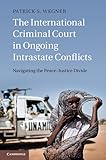The international criminal court in ongoing intrastate conflicts : navigating the peace-justice divide / Patrick Sebastian Wegner.
Publisher: Cambrdige, United Kingdom : Cambridge University Press, 2015Description: pages cmContent type:- text
- unmediated
- volume
- 9781107069473 (hardback)
- 1107069475 (hardback)
- 345/.01 23
- KZ7312 .W44 2015
Based on author's thesis (doctoral)-- International Max Planck Research School on Dispute Resolution and the University of T赢ingen, 2013.
Includes bibliographical references and index.
Machine generated contents note: 1. Introduction; 2. The ICC and its role in international politics; 3. Cross-case overview; 4. The ICC in Sudan: fighting impunity or heightening tensions?; 5. The ICC in Uganda: isolating spoilers or blocking negotiations?; 6. Transcending the peace-justice divide; 7. Conclusions and outlook.
'In recent decades, international courts have increasingly started investigating armed conflicts. However, the impact of this remains under-researched. Patrick S. Wegner closes this gap via a comprehensive analysis of the impact of the International Criminal Court in the Darfur and Lord's Resistance Army conflicts. He offers a fresh approach to peace and conflict studies, while avoiding the current quantitative focus of the literature and polarisation between critics and supporters of applying justice in conflicts. This is the first time that the impact of an international criminal court has been analysed in all its facets in two conflicts. The consequences of these investigations are much more complex and difficult to predict than most of the existing literature suggests. Recurrent claims, such as the deterrent effect of trials and the danger of blocking negotiations by the issuing of arrest warrants, are put to the test here with some surprising results'-- Provided by publisher.
'In recent decades, international courts have increasingly started investigating armed conflicts. However, the impact of this remains under-researched. Patrick Wegner closes this gap via a comprehensive analysis of the impact of the International Criminal Court in the Darfur and Lord's Resistance Army conflicts. He offers a fresh approach to peace and conflict studies, while avoiding the current quantitative focus of the literature and polarisation between critics and supporters of applying justice in conflicts. This is the first time that the impact of an international criminal court has been analysed in all its facets in two conflicts. The consequences of these investigations are much more complex and difficult to predict than most of the existing literature suggests. Recurrent claims, such as the deterrent effect of trials and the danger of blocking negotiations by the issuing of arrest warrants, are put to the test here with some surprising results'-- Provided by publisher.
There are no comments on this title.

